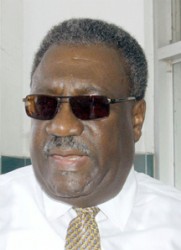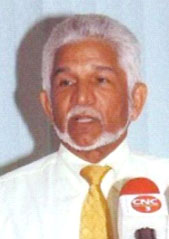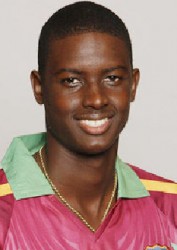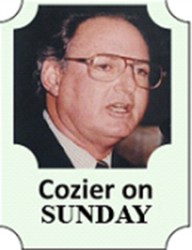By Tony Cozier
AS was eventually inevitable, Jason Holder has had the West Indies Test captaincy added to the ODI responsibility unexpectedly placed on him in January for the series in South Africa and the subsequent World Cup in Australia and New Zealand.
His record as the youngest of all West Indies captains at 23 has now been extended to the longer, traditional version.
His first assignments in his new role – two Tests in Sri Lanka next month, three in the contrasting conditions of Australia over the new year – loom as demanding as they were in South Africa and the World Cup. West Indies have not won a Test, let alone a series, in either country this century.

The apparent mitigating factors, that each is in a state of rebuilding after the retirement of key, experienced players, that Sri Lanka is coming off successive defeats at home against Pakistan and India and that Australia are under a new captain, are negated by the West Indies’ identical situation.
As was the case when Holder was first elevated to as ODI skipper, chief selector Clive Lloyd defended the latest decision, using much of the same words.
“We had a number of detractors when Holder was appointed ODI captain but he showed during the ODI series in South Africa and the World Cup that he had the qualities to take our team forward,” was Lloyd’s stated vindication.
For such a young cricketer, it came at a particularly awkward time following, as it did, the WICB’s contentious withdrawal of the team from the tour of India in October and the subsequent omission of Holder’s predecessor as ODI captain, Dwayne Bravo.
Lloyd said of the latest appointment that his panel, with the unanimous support of the West Indies Cricket Board (WICB), believed it was “the right time for a change”; it expected there would be “new thinking and new dynamism” under Holder.
Ramdin, a 30-year-old veteran of 69 Tests, led the Test team for a year over 13 Tests, from home series against New Zealand last year to the most recent against Australia.


According to Lloyd, he understood when the reasons for the switch were explained. The main issue was his recent disappointing batting form; as captain, he averaged 22 with 57 his highest score.
Yet it was clear from the beginning that Lloyd was sold on Holder to lead in both formats.
He now described him as “a young man that all of the selectors, people in the Caribbean and worldwide believes has several of the qualities that can take our team forward”.
Deryck Murray, Lloyd’s deputy during the heady days of West Indies’ domination in the 1980s, wasn’t buying it. He was concerned that it was too early to thrust Holder into the position.
He was “a little bit confused” since Holder had returned from the World Cup and fit into the Test team under Ramdin for the home series against England and Australia.
“I am not sure as to what is the policy,” he said.
Holder’s development as a batsman that has bumped his average up to 34.54, allied to his controlled seam bowling that benefits from his 6 feet, 7 inches height, has erased previous doubt that he was up to the all-rounder’s position in the team.
The problems he is certain to face are in other crucial areas.
Six of the squad of 15 for Sri Lanka are under 25, 12 overall under 30. Only five have more than 30 Tests to their name. It amounts to substantial inexperience.
It is the first time, after 21 years and 164 Tests, the West Indies team will be without Shivnarine Chanderpaul on an overseas tour. The selectors’ decision to end his career as the buttress of the batting, aged 41 and in declining form, has left a gaping hole in the team.
Jermaine Blackwood, 23, Shai Hope, 21, and Shane Dowrich, 23, who filled the middle order spots in the Tests against Australia in June, have 15 Tests between them; only Blackwood (41.26) and the left-hander Darren Bravo (41.22) average above 40.
The most glaring deficiency is that of the openers.
Kraigg Brathwaite has claimed the No.1 position as his own, even though his average dipped to 33.85 after low scores in the Tests against Australia.
In his 22 Tests, he has had eight different partners.
Of those, Chris Gayle, the most eminent, is two weeks away from his 36th birthday and suffering from a chronic back injury; he is unlikely to extend his career of 103 Tests.
Closing in on age 34 and with an average of 24.5 from his 38 Tests, Devon Smith has surely played his last for the West Indies.
Lendl Simmons has advised head coach Phil Simmons that he is no longer interested in Test cricket, Adrian Barath, a 19-year-old century-maker against Australia on debut, no longer merits a place for Trinidad and Tobago.
The elegant left-hander Kieran Powell, one of nine West Indians with hundreds in each innings of a Test, has mysteriously disappeared from the game’s radar, aged 25.
The dearth of top-of-the-order contenders is starkly illustrated by the choice of Shai Hope and Rajendra Chandrika as Brathwaite’s opening partners in the series against England and Australia.
Hope, 21, Barbados’ No.4 or 5 in the WICB’s Professional Cricket League PCL), was promoted for the first time in his career in successive Tests against England and Australia. He was replaced in the final match against Australia by Chandrika who averages 24.95 in 33 first-class matches and is yet to stay long enough to compile a hundred.
He marked his Test debut with 0 in each innings yet has been retained for Sri Lanka.
Left-hander Leon Johnson, Chandrika’s fellow Guyanese, was an obvious alternative. He is not an opener by upbringing; expediency elevated him up the order for his debut Test against Bangladesh in St. Lucia and three in South Africa last year. In spite of an average of 39.28, he hasn’t had a look in since.
There is one newcomer for Sri Lanka. Jomel Warrican has been a consistent wicket-taker at regional level for three seasons. His three for 93 from 41 overs in a three-day warm-up match against the Australians in June was enough to convince the selectors of his potential.
He is the third of his kind over the last five Tests, following Sulieman Benn and Veerasammy Permaul. With the wily leggie Devendra Bishoo the only other spinner in the squad, Warrican’s role would be crucial should the pitches encourage turn.
Above all, Holder’s tactics and influence on his players are key.
No captain can suddenly turn the water of a weak team into the wine of champions; it would be unrealistic to expect one without any experience of leading even at first-class level to do so with the current West Indies.
He can only be measured by the yardstick of general improvement.





